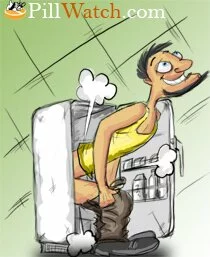
Our life today is full of stresses. Sometimes we don't notice the flow of time doing a thousand of things simultaneously. Have you ever found yourself trying to finish an urgent assignment on your computer, eating a sandwich, drinking coffee, smoking a cigarette and speaking on the telephone at the same time? How often have you stubbornly ignored signals that your stomach and other digestive organs were sending to you with a demand to go to the toilet and you postponed it for the better moment?
Very often as a result of our stressful way of living and biological and physiological needs that are not being satisfied we get serious problems connected with our gastrointestinal tract and bowels. One of the most widely spread diseases in this area is hemorrhoids.
Hemorrhoids or hemorrhoidal cushions exist in the organism of every person. They are natural components of our body. But in case when they become enlarged, inflamed and irritated or when there is a clot of blood vessels within them we speak about a disease also called hemorrhoids.
There are several types of hemorrhoids: internal (occur inside the rectum and can sometimes prolapse), external (occur in the anus, if there forms a clot or rupture of blood vessels, it is called thrombosed prolapsed hemorrhoids) and combined hemorrhoids (include the common features of both mentioned above).
The symptoms depend on the type, stage and duration of the disease. The main symptoms are: pain that can increase after defecation or after prolapse of the hemorrhoid, blood during bowel movements or in stool, itching in the anal area and protrusion of the hemorrhoid.
We should however bear in mind that bleeding can be also a symptom of more serious digestive diseases. Therefore never postpone your visit to the doctor when you have it several days.
It is a disease that doesnt have mercy on young and old, men and women. But there are certain groups of people who are at high risk to get it. They are: a) people who due to their occupation have to spend a lot time in sitting position and dont move enough; b) many women during pregnancy and after childbirth; c) people who eat spicy foods, food low in fiber and drink too little fluid; d) some people who have hereditary predisposition and some underlying medical problems, for example cirrhosis of the liver; e) and the major group at risk are those who suffer from prolonged constipation and chronic diarrhea.
There is a good point about hemorrhoids: they can be treated in any stage of their development, one must only choose the right methods and techniques. Most cases of hemorrhoids especially ones in early stages can be easily treated applying conservative methods and using of non-prescription medicine (pre-moistened wipes, ointments or suppositories) that helps to relieve one or several hemorrhoidal symptoms.
To the conservative measures belong: applying warm sitz baths, changing eating habits, increasing the amount of high fiber fruit and vegetables in the food, drinking a lot of water, taking stool softeners, applying topical compresses and ice and of course doing more physical exercises.

In severe cases of the disease the treatment is intended to shrink, destroy or remove hemorrhoidal cushions. One differentiates between non-surgical procedures and surgical removal that is held under general anesthesia (hemorrhoidectomy). The most common non-surgical procedures are rubber band ligation, sclerotherapy, laser or bipolar coagulation, cryosurgery, sphincter dilation and some other methods.
Hemorrhoids are very annoying, troublesome and at some moments very painful disease. Sometimes we regard it as shameful and try to cure by ourselves. It is quite a mistake. There is nothing to be ashamed of. It is a disease like thousand others. The only right thing we can do about hemorrhoids is to try and prevent the disease taking care of ourselves, avoiding much stress and making our life more joyous.
Lyudmyla
| Tip for you : Sign-in with Your OpenID and post faster, easier and with easy access to all your past posts. | |
|
Your Nick: |















